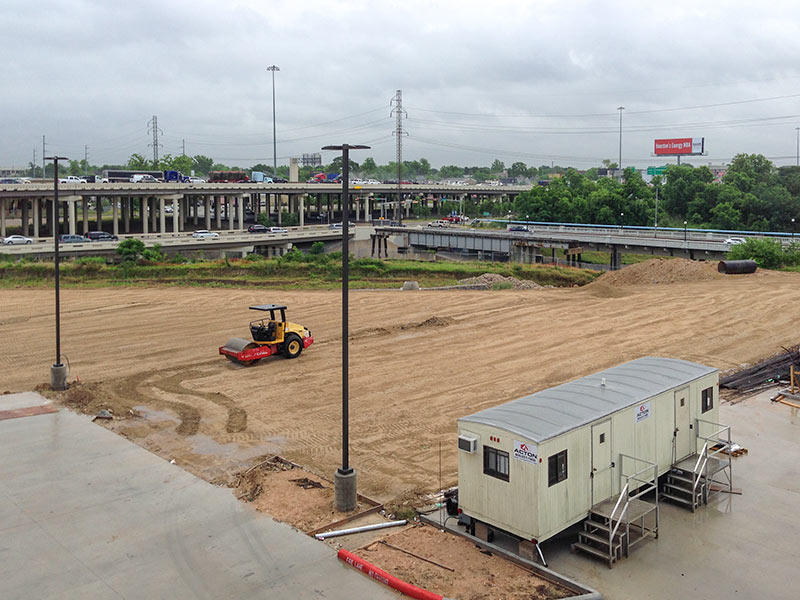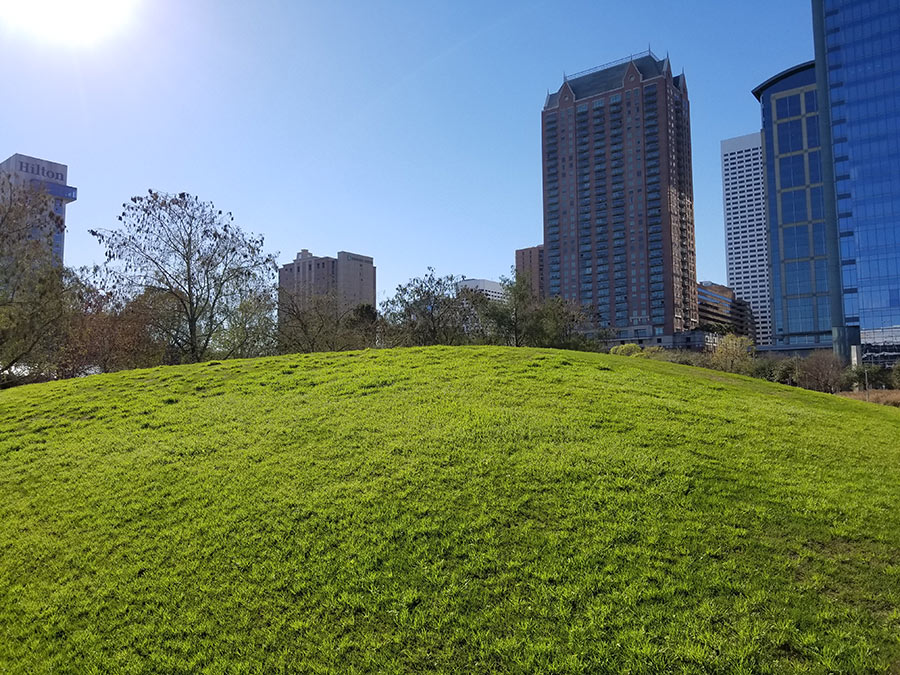
- Kirksey Report Predicts Recent Increases in Core and Shell Construction Costs for Houston Office Buildings Will Flatten This Summer, May Drop in Fall [HBJ]
- Greenville, South Carolina-Based Land Brokerage Firm National Land Realty Expanding into Houston [HBJ]
- Select Specialty Hospital — Houston Heights at 1917 Ashland St. To Close by July 3 [HBJ]
- Sneak Peek at La Grange, Opening in Former EJ’s Spot in Montrose [Eater Houston]
- Fluff Bake Bar To Open in Midtown at 314 Gray on May 28 [Food Chronicles; previously on Swamplot]
- Full Text of Metro’s Agreement with U.S. Rep. John Culberson for University Line Referendum, Commuter Rail Line on U.S. 90A [Houston Chronicle]
- Bill Signed into Law by Gov. Abbott Will Make It Tougher for Cities To Regulate Oil and Gas Drilling, Fracking [Houston Public Media]
Photo of I-10 at Yale St.: Swamplot inbox
Headlines





Someone should clarify exactly what issues old Greggy has with democracy as a form of government. You don’t get to tell cities that they have no democratic right for their own municipalities to determine which liberties are the most important to them and are worth protecting against others. A city should absolutely have every right to determine if environmental concerns are more important to them than protecting mineral rights. Industry still has the opportunity to go further and provide more safeguards to address their concerns if they want to access those minerals, but now Greg has given the industry free reign and as a lawyer himself he knows exactly what he’s done and completely taken negotiations off the table for those involved.
.
I understand Texas has one of the least and worst educated populations in the entire country, but it’s still mind blowing that people like this can get elected.
Next up, the City of Houston will be sued and no longer have the right to monitor environmental releases from industries within in our county and only a financially hamstrung TCEQ will be allowed to perform such readings. I understand the state is trying to protect industries from abuses by municipalities, but beyond being due reimbursement for financial losses due to changes in laws I fail to see why a city should not be provided the liberty to govern itself how it so chooses through democratic methods that don’t violate state regulations.
Joel,
Abbots actions on oil drilling is democratic. He signed a law created by our representatives. That’s the state level representative democracy.
The TCEQ change is fully in the bounds for executive actions. Houston can’t afford to maintain its role in EPA enforcement anyway. Ultimately nothing changes on this one. This enforcement also only truly affective when the public is involved.
Lol…Denton is a wealthy town, and a university town as well. If they’re smart they’ll make it a federal case and find a way to put the BLM in charge, so these well-meaning, hapless oil companies don’t have to suffer any more confusion about these oppressive, convoluted regulations supposedly inhibiting them from ruining everyone’s quality of life and from drilling sideways into land that’s not theirs.
Sorry, not BLM specifically, just the feds in general could be put in charge.
Joel: This issue has generated interesting responses from both my conservative and liberal friends. Speaking in the broadest terms, the liberals come down on the side of letting municipalities do what they want, and the conservatives favor state regulation. But when the issue is something like nondiscrimination, the two points of view switch places.
What is sometimes lost in this discussion is that the state is the ultimate source of political power. Cities and counties did not form the state; the state set up the mechanisms for counties and cities, delegating powers to them. Just as some issues are properly handled on a national level (defense and foreign relations, to name a couple), others are properly handled at the state level. Why should control of oil and gas operations regulations not be one of them? It has been for years.
I will not debate the issue of knuckleheads in Austin. That should be obvious to anyone with a pulse. But unfortunately it is not.
I don’t think cities really -want-to regulate underground oil operations. They do it because the State’s regulations are very weak, and the TCEQ is underfunded and undermanned to where it can barely do it’s job.
.
If Abbott had any shred of integrity that wasn’t under control of the Big Oil Lobby, he would see this. But he doesn’t, and he can’t.
So you’re so much smarter than Greg Abbott, Joel? *rolling eyes*
EJs is closed?!?!?!?! Gentrification at its worst. Yet another gayborhood hang out and slithering spot a victim of our changing demographics. Ugh!
So many questions left from the hospital closing article.
Is the whole building going to be emptied, or just the acute long-term portion?
If it’s the whole building, will the it be razed or rehabbed?
Can we expect the next batch of Luxury Condos (“From the $700s!”)?
Cities have no sovereignty. They are political subdivisions of states existing for the states’ convenience.
pfft, please clarify where I stated I was smarter than anyone? I only pointed out a statistical fact about the education level of Texans. I’m a publicly educated person from the city of Houston so I of course wouldn’t be so bold to make such claims. I would say I have more integrity, absolutely, yes.
.
kjb, how is elected representatives from across the state overriding regulations placed by locally elected representatives a more representative form of democracy? It may be legal, yes, but how is it more democratic?
.
Al, I fail to see any proof of financial harm to oil companies or landholders through placement of these type of local regulations and fail to understand why the state should have the last say in such matters. They don’t regulate alcohol bans, strip clubs and a ton of other city specific commercial/industrial regulations that affect people’s liberties. Why does the state feel that mineral rights are so much more important than other rights? I don’t see this as controlling oil and gas operations at all, but as controlling land use regulations by cities which is a very common control handed over to cities.
Not like that’s a particularly new trend. Bartini got shut down years ago and turned into that Royal Oaks bro-bar. Then there’s that newish sports bar Revelry, which wouldn’t have lasted a month in Montrose a decade ago. Montrose is already well on its way to another bro-borrough. The real question is where this stuff it’s replacing is going to relocate, or if it will. Some of them are just too established to move, like South Beach or JR’s. I’m guessing a certain amount of the gayborhood will never leave.
Land use decisions have always been the domain of municipalities. People in Denton did not want oil and gas companies using land in the community for fracking operations. So, they banned it. The legislature responded by banning municipalities from regulating anything that happens underground and severely restricted the ability of municipalities to regulate what happens above ground. This means that municipalities have absolutely no say in whether oil and gas companies can use land in the municipality for fracking. Then, the legislature is also trying to ban municipalities from using eminent domain for a new rail corridor. This is another important land use tool that the legislature is taking away from municipalities. How long before builders and developers show up at the legislature and ask to restrict or take away local control over zoning, watersheds, and other land use decisions?
Land use decisions are best left to municipalities because they are in the best position to make those decisions. Land use decisions are very, very local issues and should not be left to the Texas legislature to slop through during the biennial circus that takes place in Austin.
@HouCynic I dont think the demographic is changing as much as you think. Houston is quietly becoming a destination for couples who are professionals and accumulating wealth of their own. They are becoming integrated into society and the need to have ‘a place of their own’ is much less today. Some would call that progress.
@Spoonman: Really?
.
Then why not: “States have no sovereignty. They are political subdivisions of the USA existing for the USA’s convenience.”
.
Or: “Nations have no sovereignty. They are political subdivisions of the world existing for the world’s convenience.”
.
Why do states get special status?
the state should not be able to regulate the city banning fracking.
.
The city is banning it because it believes it to be unsafe in urban areas. In essence the state is saying it is safe in urban areas. There isn’t enough evidence though. If there is such a time when there is enough evidence to say it’s safe, then open it up, but until then, it seems to me this should be treated the same as the advanced personal vaporizer (that’s electronic cigarette to you). ban it first because popular opinion says everyone should be afraid, after it’s been sufficiently banned, then ask questions.
.
The problem is, if this state law remains in effect and urban fracking can occur, then a legitimate study links health/safety to urban fracking, now the state is on the hook. Or at least, they should be.
Sad to see so many apologists for the governor helping oil & gas subvert democracy. Corporate lemmings abound!
Why is anyone here surprised that the Texas legislature is bought and paid for by the energy business?
Of course there is the irony that many Republicans run on a platform of local control. And Tea Party types talk about promoting “freedom”, but that’s only for people who think as they do. Money talks and bulls!*t walks.
“Why do states get special status?”
.
Because of the 10th Amendment. As hamstrung as it is by Grant v. Lee (Appomattox Courthouse, 1865), it’s still in the Constitution all the same.
The celebration in getting rid of crony Perry sure did not last long…..
Does the new fracking law set precedent to let somebody challenge the 3ft and pasties rules in Houston “adult” dance clubs? I mean if Dallas can have full nude lap dances, then Houston is certainly overstepping with their draconian rules.
Many of those who support the state on this particular fight also detest when the federal government treats Texas the same way that Texas is now treating Denton. This is a very blatant example of equivocation on the matter of big government and local control.
@anon22,
Oil companies do drill sideways (fracturing) but it is into land that they have leased. So, no they are not drilling into land that is not theirs (leased). A typical oil lease in our area is 700-900 acres. Each landowner in that lease is compensated and knows what he is getting into.
Joel…I agree. Here I was hoping for some logical argument to justify the state interfering with local governments, and all I got was a false analogy and a self serving appeal to the constitution. “The powers not delegated to the United States by the Constitution, nor prohibited by it to the States, are reserved to the States respectively, or to the people” So you see Vonnegan the Constitution inevitably falls back ‘to the people’. The intent here is to always protect the will of the people. The will of the people is paramount within a democratic society unless that will harms others in his/her pursuit of life and liberty, in which case the judicial branch should step in. Minimally this should be for the courts to decide. A court would need to weigh claims of harm from the people voting on the ban vs the people claiming harm from the ban.
Kudos for Fluff Bake in Midtown! Got a taste of her sweets from Revival Market and will be sure to frequent as I work in the area.
@Memebag: States do have limited sovereignty. This is basic civics. It’s the first sentence of the Wikipedia article, even:
“A state of the United States of America is one of the 50 constituent political entities that shares its sovereignty with the United States federal government.”
Cities or counties really have no business regulating complex issues like environmental quality or oil and gas production which are well beyond their ken. Environmental regulations are subject to YEARS of epidemiological studies, a public comment period, multiple rounds of a review, and potential litigation. The federal government must BY LAW weigh costs of compliance against health benefits to the community. And for good reason: any dollar spent on compliance with a law which doesn’t provide any health benefits is wasted because it could have been spent elsewhere on health care, hiring a police officer, education, etc.
.
What city – even the size of Houston – really has the people or the money to devote to this? Harris County Pollution Control Services, for instance, simply parrots what TCEQ says but acts to impose additional conditions which serve no purpose except to feed their own sense of self-importance. They have no additional (or really any) expertise to bring to the table and offer no additional protection to people of the county except as a feel good measure.
.
Oh, not to mention that a portion of all that oil belongs to the people of Texas in the form of royalties or at the very least fees due to the TRRC. Essentially, some cities are saying they have a right to take away that revenue from the State of Texas and the people of Texas for some undefined benefit of the people in their cities.
.
I find it quite ironic that some people like @joel claim Abbott’s actions are undemocratic or an indicator of poorly educated Texans when he supports circumventing the environmental review process and is so ill-informed on the issue.
“The people” means “not the government”. The City of Denton is not “the people”. If you’re advocating removing land use restrictions from the domain of government, I’m all for that. But I don’t think that’s what you’re advocating.
C’mon Joel. If you’re going to make a statement, stand by it. Don’t try and weasel out out.
It is disingenuous to call Denton’s fracking ban an environmental regulation or an oil and gas regulation. It is simply a land use regulation. Municipalities should have the right to say what residents want and do not want people to do with the land in a municipality. Municipalities should not have to rely on one size fits all solutions from the Texas legislature. If a municipality does not want strip clubs, bars, land fills, nuke plants, chemical weapons incinerators, mountain top removal mining, race tracks, horse tracks, etc., municipalities are in the best position to decide whether to permit or ban those activities. Otherwise, you essentially have a system where people in El Paso, Amarillo, Beaumont, Corpus Christi and Laredo get to decide land use issues in a community that is hundreds of miles away.
There are activities that we happily tolerate in rural areas that we wisely prohibit in cities (pig farms, hunting). I think fracking should be one of these, and I say that as someone who works in the industry. The problem is that fracking is a very noisy activity that involved a stream of extremely heavy trucks continuously cycling through to a well pad, often for as long as a month or more (excluding drilling time) on a single pad. While the fracks are happening, you have many (12 or more) enormous diesel engines running full tilt pressuring up the sand and water for pumping downhole. Out in the country, this is not so bad–the noise is less likely to disturb people, the pumps and sand chiefs are not likely to snarl traffic, etc. (Roads do get mighty worn down, though.) But in a city, a frack job is a nightmare. As annoying as a big construction job can be for a neighborhood, a frack job would be many times worse. And it would leave the nearby streets in shambles–a fully loaded sand chief is HEAVY, and it takes a steady stream of them to frack a well.
BUT, all this may be moot. If Denton (or any other city) wants to ban fracking within their city limits, they can probably do it with noise ordinances and vehicle weight requirements.
@Robert Boyd: “BUT, all this may be moot. If Denton (or any other city) wants to ban fracking within their city limits, they can probably do it with noise ordinances and vehicle weight requirements.”
.
I don’t see how cities have a legal standing to do anything if they can’t ban fracking. If all political power resides at the state level, as seems to be argued in these comments and in the Texas legislature, then cities exist only for the convenience of states, and I’m not sure how convenient they are. Why would cities have the power to regulate noise or vehicle weights if that was inconvenient for the state?